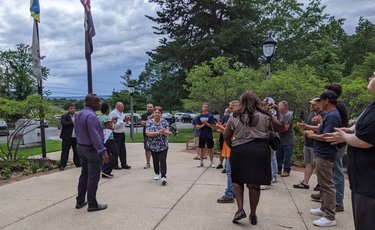Guilderland Town Board voluntarily recognizes CSEA to represent highway workers
GUILDERLAND — Keeping its word, the Guilderland Town Board on July 1 held a special meeting to voluntarily recognize the CSEA as the exclusive representative of the town’s highway workers who want to unionize.
A majority of the 43 operators, laborers, and mechanics in the potential bargaining unit signed cards choosing the Civil Service Employees Association as their bargaining representative, the union told The Enterprise in April.
On June 17, more than a dozen highway workers attended a town board meeting to complain about delays in the process and to urge the board to grant “voluntary recognition” as they seek to unionize. All five of the board members on June 17 voiced support for the efforts to unionize.
Supervisor Peter Barber explained on June 17 and reiterated on July 1 that the town board could not act until the Public Employee Relations Board had determined a majority wanted to unionize. “Then I will ask the board to voluntarily recognize CSEA,” he said.
Barber said the town had been through the process before, with the Teamsters. “PERB looked at the cards and ultimately determined there was not a majority ….,” he said of the effort to unionize with the Teamsters.
As he’d indicated he would on June 17, Barber called a special meeting, which he said was “rare,” so that the town and the CSEA could begin the process of working out a contract sooner.
On July 1, all four of the board members present — Barber, Deputy Supervisor Christine Napierski, Councilwoman Amanda Beedle, and Councilman Gustavo Santos — voted in favor of the resolution to voluntarily recognize the CSEA “as the exclusive bargaining agent for the employees of the Town’s Highway Department for the purpose of collective bargaining.”
Councilman Jacob Crawford, who voiced support for the measure on June 17, was out of town, Barber said.
The resolution noted that the CSEA had filed a certification petition with PERB on May 23 and also that the town received a June 20 letter from PERB, stating that a majority of highway workers had signed dues deduction authorization cards designating the CSEA as their exclusive representative for collective bargaining.
After the brief July 1 meeting, held for a single resolution vote, Santos spoke to a score of pro-union workers outside of the town hall. They applauded as he congratulated them on their efforts.
However, not everyone was happy.
Before the vote, Donald Lindley addressed the board, saying that he spoke on behalf of highway workers who oppose unionizing.
Lindley wanted to know if all the highway workers would be required to pay dues to which three of the board members responded they would not.
Beedle cited the 2018 decision, Janus v. AFSCME, in which the United States Supreme Court ruled that union fees in the public sector violate First Amendment rights.
Lindley alleged that those organizing for a union did not go to the town’s highway superintendent, Bob Haver. “They wanted fairness and having a seat at the table. They didn’t take that to the superintendent themselves. They went to an outside agency to negotiate for them,” said Lindley.
He also said, “Not everybody in the shop was informed there was an intent to unionize,” which included himself.
Lindley also questioned the card count, claiming one worker retired, two are no longer with the department, and several workers said they were harassed to sign on.
Lindley preferred, rather than the board giving voluntary recognition, that there be an election.
Barber told The Enterprise after the meeting that the board members do not know what the card count was. A judge determined that a majority was present, he said.
While the card count is often referred to as a vote, Barber said, “It’s a snapshot in time.” Each worker that wants to unionize signs a card authorizing the deduction of dues and indicating, in this case, that the CSEA would be their sole representative.
Barber also noted there are processes outlined in the state’s Civil Service Law to rescind recognition.



